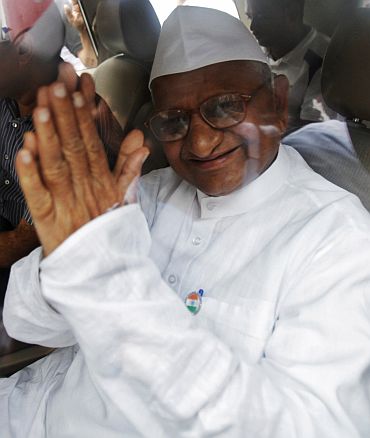
A legal tussle between Team Anna and the government of India now seems certain after the social activist's proposed indefinite fast against corruption was forcibly curbed. Vicky Nanjappa explains the nitty-gritty of such a case before the apex court.
The battle for an effective Lokapal bill turned uglier on Tuesday morning with the government imposing its might over the protestors led by social activist Anna Hazare and taking them into preventive custody in the national capital.
While several issues on moral grounds are being raised, the fact remains that this battle will end up in the Supreme Court and both parties i.e. the Centre, the Delhi police and also the Anna Hazare group will have a lot of questions to answer regarding this incident.
So what would a case called Anna Hazare and others vs the government of India look like? Legal experts say that the battle before the apex court would dwell more on the points regarding the protest and the preventive custody, and the court on the other hand will have to lay down a definitive law to ensure that future protests do not turn ugly this way.
...
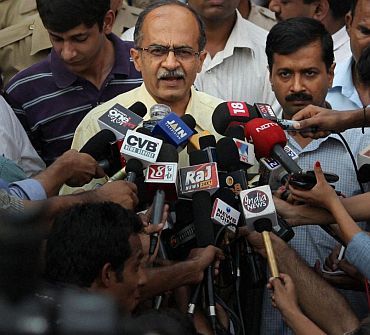
The arguments from this group would include mentioning of the Gandhian ways of protest which revolved around hunger strikes. They would further say that this is the most peaceful and democratic form of protest in the country and even Mahatma Gandhi had attained independence through peaceful means.
Further their advocate would also argue that at no point of time have they resorted to any sort of violence and even their protests in the past have been peaceful.
They would quote the provisions in the Constitution under Article 21 and also the freedom of expression which gives them a right to stage a peaceful protest.
They would also argue that they had sought legitimate permission, but were denied, and hence, they cannot be accused of not following procedure.
The fact that they decided to continue with the fast despite permission being denied will also be countered with the fact that in a democracy permission cannot be denied when one wants to protest failing which the very meaning of democracy is lost.
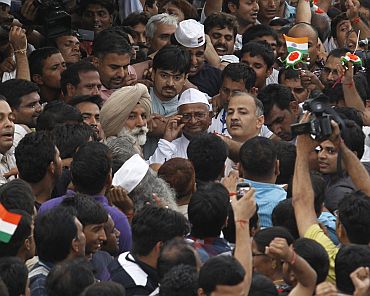
However, this group may face a problem when an argument relating to 'fast unto death' is brought up. Although the Hazare group may argue that it is not a 'fast unto death' but an 'indefinite fast,' the government can argue that it means one and the same.
The Indian Penal Code is very strict about suicides and terms it as an 'offence.' However, the Hazare group can only argue this on moral grounds saying that their intention was never to kill themselves, but it was the only way remaining to seek their demands.
They would also try and downplay this part of the argument on the legal front by stating that attempt to suicide are cognisable offences and the intention was never to create a ruckus or disrupt peace and harmony.
They would further their argument by stating that a day before the fast, Hazare had made it clear that the protests shall be peaceful and even if they land in jail, peace and harmony shall be maintained.
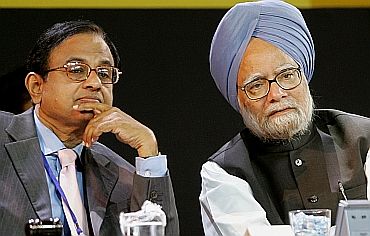
The first point of argument from the government side is that this is not a case of 'preventive detention' but a detention more on apprehension that peace would be disturbed.
The local police station is very much within its limits to detain any person if they feel that the calm in the city will be disturbed by his/her conduct. The police and the government have the statutory power to maintain law and order.
The point which they would stress on the most is that despite permission for a fast being denied, Team Anna went ahead with it anyway, and this itself shows the intention of the group.
When they can break the law by not abiding to the denial of permission then we have no guarantee that they would maintain peace during their protest, the government would argue.
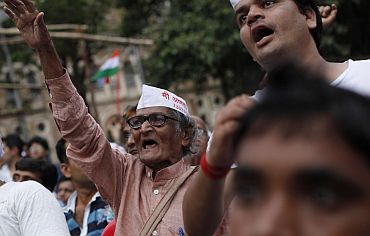
If we had allowed a huge gathering to go on a mass hunger strike there was chance that things would have turned violent. We had specific intelligence that some anti-social elements had intention of stirring up passions so that the protest would turn violent. Hence, in the interest of the people of Delhi and in the interest of law and order it became mandatory for us to think that prevention is better than cure, the government side would further argue.
Further they would also state that when Section 144 or prohibitory orders are in place, it is unlawful to have an assembly of more than four people.
"Fasting may be a peaceful way of protesting, but when it is done by a large gathering with emotions so high there is every chance of it turning violent and hence we had to take preventive action," they would possibly add.